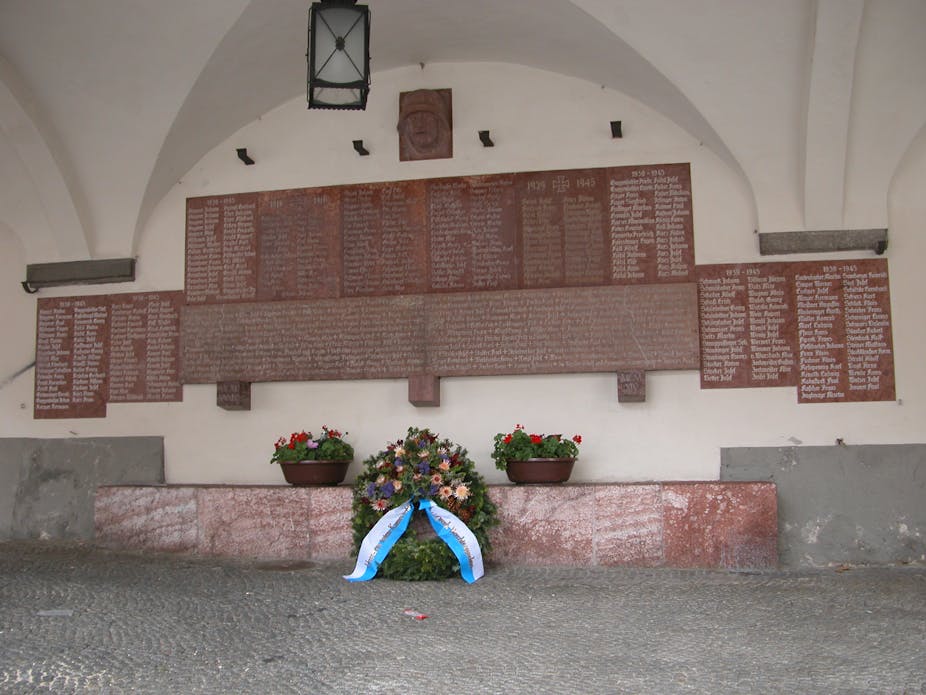There is not much of a question of who controls the national myth of the Great War in Germany today. Nobody in particular seems to want to claim it. More interesting, however, is considering who has sought to own it in the past. Only then can we understand why the First World War has in many respects become a non-issue for Germans and their perceptions of national identity in the lead-up to the centenary commemorations.
In Britain the sense of horror at so many deaths in the trenches still seems to push people into a search for deeper national meaning in the Great War. In Germany such feelings are overshadowed by intervening layers of even worse horror or trauma – the Second World War, the Holocaust, and the communist period in East Germany.
After the Second World War
The most sustained and influential attempt to construct a lasting German national myth of the Great War came in the first two decades after the Second World War. In West Germany, a group of conservative professors led by prominent historian Gerhard Ritter sought to rescue the idea of patriotism from its manifest perversion under the Third Reich.
In a letter to his British colleague George Peabody Gooch in 1947, Ritter defended what he saw as the “true front spirit” of the Great War, namely “willingness to serve without cliché, without self-glorification and without imperialist claims to world domination”. He contrasted this with the “arrogant, theatrical, false” militarism practised by the Nazis.
In short, German soldiers had fought an honourable, defensive war in the First World War; in the Second World War they had been (mis)led by a demagogic “madman”.
Ritter created what can be described as the only really successful and widely supported national myth of the Great War in post-1945 Germany. His message was one that many West Germans in the 1950s wanted to hear: that the Third Reich had been an “accident” and ordinary German people were not to blame for the Nazis’ crimes.
Many Germans felt the Treaty of Versailles had unjustifiably saddled the German Empire with sole responsibility for the outbreak of the Great War. As West Germany prepared to become a NATO member in 1955, Ritter’s argument made it possible for the nation to feel proud of its military traditions.
Like many other representatives of the “front generation of German historians”, Ritter himself was a veteran of the Great War. He had fought on both the eastern and western fronts from 1915 to 1918. His patriotic credentials were further strengthened by his involvement in conservative resistance circles against Hitler - he spent the last few months of the Third Reich in Gestapo custody.
The Nazis’ myths of the Great War had been overtly militaristic and aggressively anti-western. Ritter now offered a myth that fostered national feeling but also fitted in with Germany’s desire to be a part of Europe and the west.
50th anniversary
The First World War’s 50th anniversary, however, was less comfortable. In 1961, Fritz Fischer, previously a relatively obscure West German historian, published a book that claimed – in contrast to Ritter’s arguments – that there were strong continuities between German aims during the Great War and those pursued 25 years later by Hitler.
The ensuing controversy dominated headlines in West Germany during the 50th anniversary commemorations of the First World War in 1964. In the long run, it communicated – positively – that there would be no more uncontested patriotic myths or “illusions” about this particular period in Germany’s past.
Perhaps more importantly, the hostile treatment that Fischer received at the hands of fellow historians – and the support he won from younger generations of students and journalists such as Rudolf Augstein, editor of Der Spiegel – ensured that an elite group of academic professors, whether as veterans or revered scholars, could no longer claim dominance over the “national” interpretation of the Great War.
Looking forward
Moving forward to the 75th anniversary in 1989 and the centenary year in 2014, the Second World War has almost fully replaced WW1 as a focus for critical public engagement with the past and reference point for debates about the place of the 20th century in German national memory.
This explains the surprised response in the German media to news of Britain’s extensive, well-planned and relatively well-funded programme of commemorative events. The [Frankfurter Allgemeine Zeitung](http://www.faz.net/aktuell/feuilleton/debatten/100-jahre-erster-weltkrieg/britischer-gedenken-ein-endsieg-im-ersten-weltkrieg-12868958.html](http://www.faz.net/aktuell/feuilleton/debatten/100-jahre-erster-weltkrieg/britischer-gedenken-ein-endsieg-im-ersten-weltkrieg-12868958.html) newspaper, for instance, referred in March 2014 to a “Britischer Gedenk-Marathon” or “British commemoration marathon”.
Australian historian Christopher Clark’s recent book arguing that the European powers “sleep-walked” into war in 1914 has also been well-received.
Germans today have little appetite for constructing new national myths about the Great War, or reclaiming old ones, precisely because of painful associations with the more recent past.
Read the other articles in The Conversation’s Commemorating WWI series here.

